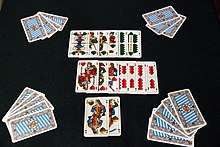Donkey (card game)
Donkey, also known as Pig, is a collecting card game that is best for five or six players. It is played with a 52-card French pack.[2] It has variants such as Spoons and may be descended from an old game called Vive l'Amour.[1]
| Alternative names | Pig |
|---|---|
| Type | Collecting |
| Players | 3-13 (4-7 best)[1] |
| Skills required | Stealth, memorising |
| Age range | 7+[1] |
| Deck | French |
| Play | Clockwise |
| Related games | |
| Happy Families, My Ship Sails, Spoons | |
Rules
The following rules are based on Arnold (2009) and Parlett (2008).[1][2]
Preliminaries
A standard 52-card pack is used from which as many quartets (four of a kind) are removed as there are players. For example, six players would use 24 cards which could be four each of Aces, Queens, Tens, Sevens and Threes. This sets the maximum number of players at thirteen; Parlett suggests that five or six is optimum, while Arnold suggests four to seven are best. Any player may deal as the role of dealer is not critical, nor is the position of players in the round. Players are dealt four cards each.
Playing
Each player looks at their hand and selects a card to get rid of, passing it face down to the player on their left. Players do this simultaneously, not in rotation, so that players cannot use the card they receive to decide what to shed. Once again, players examine their cards and pass one card to the left. This process continues until one player has collected a quartet in their hand, called a book.[1]
The player with the quartet does not announce it, but quietly places their hand down and touches their nose, keeping it there. As other players notice, they do the same. The last player to touch his nose is the Donkey (or Pig), i.e. the loser.
Variants
Spoons

The following rules are based on Arneson.[3]
The aim is as for Donkey: to be first to collect a quartet. Two or more play using one or more 52-card French decks. A number of spoons, one fewer than the number of players, are placed in the middle, handles outwards. The dealer deals four cards to each player and places the rest down as a stock. He then draws the top card from the stock, and either discards it or exchanges it with a hand card, passing the discard, face down, to the player on his left. The next player selects a hand card to discard and passes it to his left. Subsequent players do the same, in rotation, except for the last player, who discards his card into a wastepile next to the stock. This process continues, with the dealer drawing from the stock and the last player discarding to the wastepile. If the stock runs out, the dealer draws from the wastepile.
As soon as a player has a quartet, he takes a spoon. As other players notice, they do likewise until one player is left, empty-handed, as the loser. He or she is either eliminated, the game reducing by one player each round. Alternatively the loser is given the letter "S" and, for each subsequent loss, another letter from the word, spoon, dropping out of the game when they reach "N". In either case, the game continues until only two are left to fight it out; the winner of the last game becoming the overall winner.
Strategies may include:
- Bluffing: Bluffing is allowed. Spoons may be reached at any time as long as they are not touched. This may distract the others or even cause someone to grab a spoon prematurely which may result in their elimination.
- Eyes on the spoons: Players keep an eye on the number of spoons in case one has been taken without anyone noticing.
- Eyes off the cards: Players play without looking at their hands, just passing the discards on while watching the spoons.
Other variants
- Extreme Spoons: Instead of placing the spoons in the middle, they are placed in some inconvenient location nearby.
- Joker Spoons: The deck includes jokers which act as wild cards.
- Tongue: The first player to collect a quartet, sticks out his tongue. The last one to do likewise loses.
See also
- Happy Families - another quartet-collecting game
- My Ship Sails - a collecting game in which seven or eight cards of one suit are needed to win
- Musical chairs
References
- Arnold 2009, p. 89.
- Parlett 2008, p. 399.
- Arneson 2019.
Literature
- Arnold, Peter (2009). Chambers card games for families. Chambers Harrap, Edinburgh. ISBN 978-0550-10470-0
- Parlett, David (2008). The Penguin Book of Card Games, Penguin, London. ISBN 978-0-141-03787-5
External links
- Arneson, Erik (2019). How to Play Spoons at www.thesprucecrafts.com.
- Rules for Spoons at boardgames.about.com
- Rules for Pig at Classic Games and Puzzles.com
